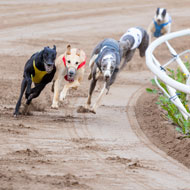Greyhound injury and retirement data published

There were a total of 4,837 injuries and 257 track fatalities in 2017.
Nearly 5,000 racing greyhounds were injured in 2017, according to new figures published for the first time.
Furthermore, just over 1,000 dogs died or were euthanised, of which 270 were deemed unsuitable for rehoming, 257 were trackside fatalities and 333 were euthanised due to treatment costs or poor prognosis.
The figures were published by the Greyhound Board of Great Britain (GBGB), which governs the racing industry.
Responding in a statement, the Greyhound Trust said the figures were ‘unacceptable’, but pledged to work with GBGB to reduce euthanasia levels and increase successful rehoming rates.
Neil Parish MP welcomed the publication of these figures, which the Environment, Food and Rural Affairs (Efra) Committee, called for in February 2016.
However, he is urging GBGB to work towards reducing the rate of euthanasia. He is also pressing the government to introduce a statutory levy of one per cent gross turnover, to ensure greyhound welfare is adequately funded in future.
Key figures from GBGB include:
- there were a total of 4,837 injuries and 257 track fatalities
- just over 86 per cent of retiring dogs (6,391) were rehomed or retained by the owner/trainer
- just under 14 per cent of dogs died or were euthanised, of which 25 per cent were euthanised trackside on humane grounds
- twenty-seven per cent of dogs were deemed unsuitable for rehoming, while homes could not be found for a further 20 dogs
- the remainder (eight per cent) were euthanised or died due to medical or other reasons, terminal illness and natural causes.
Greyhound Trust chief executive Lisa Morris-Tomkins commented: “The number of racing greyhounds who never have the opportunity to experience a loving home when their racing career is over is unacceptable, and the base line injury and retirement figures published must be improved; it is unacceptable that any greyhound suitable for homing is euthanised.
“This is why the Greyhound Trust have committed our expertise and experience to work with the GBGB on two key welfare projects: a behavioural assessment project and an injury recovery scheme, which will maximise the opportunities for greyhounds to transition to a family pet.”



 The RCVS has announced a new version of its 1CPD mobile app, with enhanced features for veterinary surgeons and veterinary nurses to record their continuing professional development.
The RCVS has announced a new version of its 1CPD mobile app, with enhanced features for veterinary surgeons and veterinary nurses to record their continuing professional development.